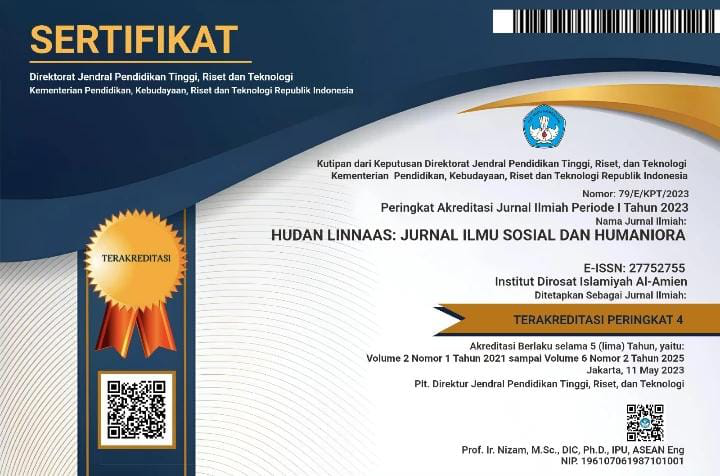IDENTIFIKASI SIKAP UNCONDITIONAL POSITIVE REGARD KONSELOR DALAM CERITA RAKYAT KE’ LESAP
Abstract
This research will describe the story of Ke' Lesap, the Hero of Madura Island's Independence. From this story, we will analyze and explain in detail the personal portrait of Ke' Lesap, the Hero of Madura Island Independence, as well as the representation of the attitude of unconditional positive regard in the Madurese folklore Ke' Lesap for the development of the moderate personality of the counselor. The Ke' Lesap folklore is the story of a young warrior from Madura who fought for the Madurese people from misery and poverty. The glory of a Ke' Lesap who helps others unconditionally, especially those who are helped are Madurese people from ordinary circles. This attitude is a reflection of the unconditional positive regard attitude. The research method used is a qualitative descriptive method with the type/design of this research using library research/literature study, namely research whose area of study is libraries or literature. The data collection techniques used in this research are listening, reading, listening and note-taking techniques, as this type of research is literature/library study which is a data collection technique using written sources or reading books. The results of the research show that there are ten types of Ke' Lesap personality which are characteristics of an unconditional positive regard attitude, namely friendly and open, sincere, sympathetic, respectful of others, helpful, firm in reminding, respecting diversity, brave, having a high sense of brotherhood. , and never give up.
Keywords
References
Anshari, R., & Dkk. (2021). Buku Monograf : MODERASI BERAGAMA DI PONDOK PESANTREN. Yogyakarta: Penerbit K-Media.
Arifin, S., & Ayuanita, K. (2020). Nilai Didaktis Dalam Cerita Rakyat Ke’ Lesap Pendekar Kamardika’an E Polo Madura Perspekif Ali M. Natsir. GHANCARAN: Jurnal Pendidikan Bahasa Dan Sastra Indonesia, Vol. 1, pp. 112–122. https://doi.org/10.19105/ghancaran.v1i2.2983
Arikunto, S. (1988). Pengelolaan Kelas dan Siswa. Jakarta: CV. Rajawali.
Depdiknas. (2002). Kamus Besar Bahasa Indonesia (3rd ed.). Jakarta: Balai Pustaka.
HAG, T. (2011). Psikologi Tasawuf. Bandung: Pustaka Setia.
Holcomb-McCoy., C., Harris., P., Hines., E. ., & Johnston., G. (2008). School Counselors’ Multicultural Self-Efficacy: A Preliminary Investigation. Journal: Professional School.
Lickona, T. (2009). Educating for character: How our schools can teach respect and responsibility. Bantam.
Mardalis. (1995). Metode Penelitian Suatu Pendekatan Proposal. Jakarta: Bumi Aksara.
Mayasari, S. (2020). Karakteristik Konselor Pada Calon Konselor Berdasarkan Perbedaan Kelompok Gender. Jurnal Psikologi Malahayati, 2(2), 26–35. https://doi.org/10.33024/jpm.v2i2.3023
Mengingatkan, S., & Berdakwah, D. (2013). Fathur Rijal.
Moestadji, M., & Brotoasmoro, M. . (1983). Ke’Lesap : pendekar Kamardika’an e polo Madura. Surabaya: S.N.
Poerwadarminta. (2007). Kamus Umum Bahasa Indonesia. Jakarta: Balai Pustaka.
Pratiwi, S., Nugraheni, T. W., & Mulyadi. (2021). Potret Perubahan Karakter Ramah dan Percaya Diri pada Anak Usia Sekolah Dasar di Kampung Wisata Pelangi Semarang. Icee, 51–59.
Rogers, C. (1961). On Becoming a Person. E-book. USA: Houghton Mifflin Company Boston.
Sears, D. O., Freedman, J. L., & Peplau, L. A. (1994). Psikologi Sosial jilid 2. Jakarta: Erlangga.
Shertzer. B., dan Stone, S. C. (1974). Fundamentals of Counseling. Boston: Houghton Mifflin Company.
Sudrajat, A. (2011). Mengapa Pendidikan Karakter. Jurnal Pendidikan Karakter, (1). Retrieved from https://journal.uny.ac.id/index.php/jpka/article/view/1316
Sukardi. (2003). Metode Penelitian Pendidikan. Jakarta: PT. Bumi Kasara.
Taryati dkk. (1995). Pembinaan Budaya dalam Lingkungan Keluarga Daerah Istimewa. Yogyakarta:
Departemen Pendidikan dan Kebudayaan, Direktorat lendral Kebudayaan Direktorat Sejarah dan Nilai Tradisional Proyek Pengkajian dan Pembinaan Budaya.
Tasmara, T. (2002). Membudayakan Etos Kerja Islami. Jakarta: Gema Insani.
Zubaedi. (2006). Pendidikan Berbasis Masyarakat. Yogyakarta: Pustaka Pelajar.
DOI: 10.28944/hudanlinnaas.v5i2.1905
Refbacks
- There are currently no refbacks.

This work is licensed under a Creative Commons Attribution-NonCommercial-ShareAlike 4.0 International License.







.png)